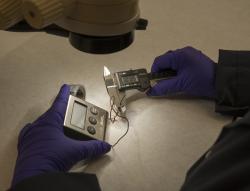

ATF’s forensic firearm and toolmark examiners analyze firearms and tools found at crime scenes to help investigators solve criminal cases. For example, they can examine microscopic marks on bullets and cartridge cases to determine if the marks were made by a suspect’s firearm.
To conceal their identity, suspects may remove or alter serial numbers on firearms. ATF’s firearm examiners use a variety of techniques to restore obliterated serial numbers and assist investigators in tracing the firearm. They are also able to evaluate cartridge cases from different crime scenes and determine whether they came from the same firearm.
For bombing and arson investigations, toolmark examiners analyze objects such as pipes, wires and locks for toolmarks. The marks they find can provide an investigative lead as to a particular tool used by a suspect.
Firearm and toolmark examiners work in one of ATF’s three forensic laboratories throughout the United States. They also train new examiners at the National Firearms Examiner Academy (NFEA).
Firearm and toolmark examiners must have prior formal training before conducting any type of casework. Newly hired examiners go through on-the-job training to assess their level of expertise and receive additional training to ensure they meet ATF’s examiner standards. Applicants new to the field must attend the NFEA course, receive additional on-the-job training and pass an assessment for their proficiency within the discipline.

Firearm and toolmark examiners teach courses for law enforcement partners at NFEA and provide an overview of their services to new ATF recruits during Special Agent Basic Training. They teach local, state, federal and international law enforcement agencies on topics such as toolmark identification and serial number restoration.
Examiners evaluate equipment for use within the forensic firearms field, publish their research in professional journals and present their findings to professional organizations. In addition, they represent ATF in the Organization of Scientific Area Committees for Forensic Science, which develops and reviews policies for the forensic field.